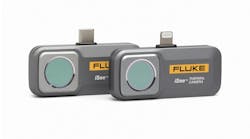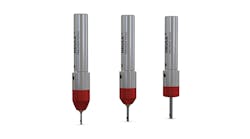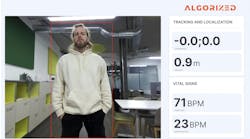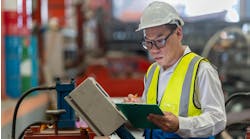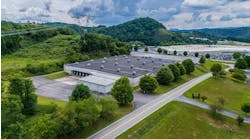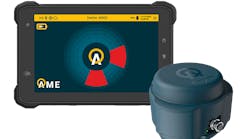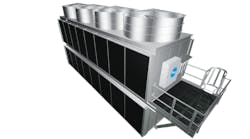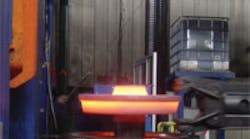Recently, railway equipment manufacturer Construcciones y Auxiliar de Ferrocarriles (CAF) launched production of carriage wheels on a new pre-form hydraulic press, supplied by Schuler SMG. The plant in Beasain, Spain, produces all types of railway cars: simple cars, underground trains, locomotives, and high-speed trains.
The new hydraulic pre-form forging press will carry out the first stage in the railway wheel production process. With a press force of 11,250 metric tons, it compresses a 2,200°F round block of steel into a “cake,” ready for forming.
In the second stage, it is forged into a pre-formed wheel. A wheel-rolling machine then continues to form the preformed product into a wheel before it receives its final shape by punching the hub in a 2,800-metric ton press.
Mikel Mendoza, project manager for wheel production at CAF, explains that the new press allows the pre-forms to be sized much more precisely, resulting in less rolling work in the downstream wheel rolling machine.
The new press has also reduced the line’s cycle time, according to Mendoza.
This 5,000 ton crimping press, shown here being assembled at Schuler Waghusel, Germany, was installed recently at CAF in Beasain, Spain.
“The line is designed in such a way that a fully formed wheel leaves the line every 90 seconds,” adds Dr. Walter Osen, head of the forging business unit at Schuler SMG.
To extend the potential of CAF’s new press, new dies were developed in cooperation with Schuler Presses. “The aim is to reduce input weight by up to 10% with the aid ofthe new dies,” said Osen.
Process automation improves productivity and material efficiencies, reducing transport times from the oven to the press, and to the wheel rolling machine. “As a result,” Mendoza explained, “the furnace temperature can be lowered and energy savings can be made."
A new forged wheel is completed every 90 seconds.
Record-setting redesign
The new press was integrated into a completely redesigned production line within a record time of 10 days. During the three preceding months, teams of suppliers installed the new 11,250-metric ton press while production activity continued, and equipped the furnace, de-scaling line, press, and wheel rolling machine with robotics. Those automation systems link the production steps into a fully automatic line with automatic ejector stations.
The power and high press force of the machine are demonstrated by the design parameters. The main cylinder has a diameter of around 10 ft. The respective hydraulic system contains 8,000 gallons of hydraulic fluid. The whole system requires four megawatts of power. Lubrication and cooling ensure the production process is as smooth as possible. Three robots cool the dies before, during, and after the forming process and spray tehm with a water-graphite mixture.
By the end of this summer, a new 5,600-metric ton flanging press, also supplied by Schuler SMG, will replace CAF’s former 2,800-metric ton press to complete the modernization of the final pressing and punching of the wheel hubs.

